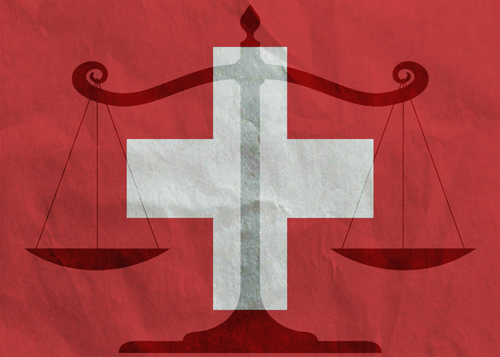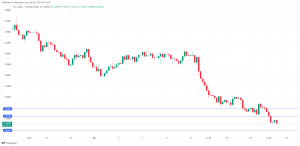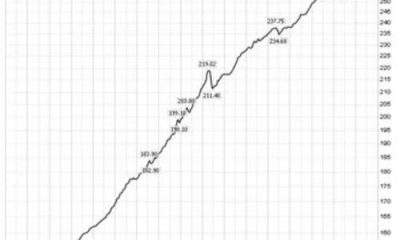Economics
Swiss Neutrality Is Needed Now, More Than Ever
Swiss Neutrality Is Needed Now, More Than Ever
Submitted by Vahan Roth, CIO, RealUnit Schweiz AG,
Throughout human history, there is a common…

Swiss Neutrality Is Needed Now, More Than Ever
Submitted by Vahan Roth, CIO, RealUnit Schweiz AG,
Throughout human history, there is a common denominator across all nations, cultures and political systems. Very regrettably, war, conflict and violence are universal and omnipresent since the emergence of our species, a fact that grimly suggests that these plights are part and parcel of the human condition and will thus always be with us.
It is therefore all the more remarkable and precious to find an exception to that lamentable rule.
Today, one such exception truly stands out: Switzerland, that small alpine nation that has been going against the grain consistently since 1815; the nation that somehow defies this deplorable, pan-human, misanthropic compulsion and that stubbornly insists on defending peace domestically and impartiality internationally.
In theory, it surely sounds great, honorable, exemplary even. In practice, however, it is not and has never been an easy task. No other country has managed to champion and sustain a neutrality stance the way Switzerland has. In fact, in many cases, due to high time preference or due to a fixation on expansionism, many nations haven’t even aspired to it or recognized its value. Switzerland has not only survived, but thrived during the harshest times, through world wars, through geopolitical mayhem and global economic meltdowns, and it is all chiefly thanks to its steadfast neutrality position. This tiny, landlocked, mountainous and mostly resourceless nation, made up of strikingly diverse and heterogeneous people that don’t even share a common language, has weathered all storms and faired better than most of its more fortunate peers.
However, Switzerland is no stranger to challenges and pressure from the outside. Let us be cynical for a moment and recognize that most of the nations that join alliances and pick sides do so to protect their own interests and not to defend whoever happens to be “the good guys” at the time. This has been true since time immemorial, from mutual defense pacts between ancient city states to NATO today. The alpine nation has thus frequently been seen as an obstacle to other countries’ goals and aspirations and the arm-twisting to “choose a side” has been fervent and unrelenting in times of conflict. Fortunately, Switzerland never gave in.
This dogged intractability is fortunate indeed, but not only for Switzerland itself. It has also benefitted its neighbors and the international community at large, although memories in general are short these days and the role of Switzerland during major conflicts is omitted from most history textbooks. Because of this implacable, reliable and unwavering commitment that the nation has clearly and consistently demonstrated to its impartial stance, it is globally seen as a trustworthy party that can be relied upon. That becomes especially important and practically constructive in times of geopolitical tension or even all-out war.
During these dark times, Switzerland has repeatedly played a pivotal role today and it continues to do so today. From participating in mediation mandates in WWI, to monitoring the 1953 ceasefire in South Korea and acting as a mediator in the final phase of the Algerian War, the country has long served as a backchannel communication facilitator, as a peace broker and as an arbitrator. It has expedited diplomatic solutions that brought an end to violence and saved lives that would have otherwise been lost to mindless and unnecessary hostilities.
As mentioned before, it has never been an easy task to remain neutral, especially in times of all-out conflict. The nation has been tested time and time again and it is being tested once more, now. In fact, one might argue that this might very well be one of the toughest tests it faced so far. Today, this neutrality position is being criticized and challenged because of the nation’s clear refusal to “take sides” in the Ukraine/Russia war – at least not in a way that would clearly violate its own founding principles.
The Swiss government had the courage to reaffirm its adherence to its neutrality stance in the beginning of the year. Most European nations and the US had been pushing for months the international community to go a step further than the sanctions and the asset freezing against the Russian State and individuals or companies connected to it. They were advancing the idea of confiscating said Russian frozen assets and using them to support Ukraine’s rebuilding, to “cover the costs of aggression”. While Switzerland during this particular conflict certainly and clearly bent its neutrality rule (through public statements supporting Ukraine and by abiding by the sanctions and freezing billions in Russian assets), the tiny nation proved it did not altogether forget or abandon its principles: As the Swiss government declared in February, seizing those frozen assets and handing them over to the Western allies to use as they see fit would be a step too far: ”The confiscation of private Russian assets would undermine the Swiss constitution and the prevailing legal order”.
Although this move proved wildly unpopular with allied nations, we must bear in mind that what’s popular and what’s right are often two very different things. More pertinently, determining who is right during any war, not just the currently ongoing one, is a near-impossible task. In these cases, the moral lines are prohibitively blurry, unlike conflict on an individual level, where one can assess the facts, clearly identify the aggressor and thereby justify a proportionate reaction by the wronged party as self defense. Let’s say, Paul hits Peter, unprovoked, and Peter strikes him back (he just strikes Paul mind you, not his kids, not his neighbor, not his dog), so Peter is right; case closed. When we’re talking about state warfare, however, there is no right side: No matter what the “casus belli” was and “who started it”, all subsequent acts of warfare and violence are directed at the people that are the least likely to bear any personal responsibility for the conflict. Indiscriminate, collectivist violence itself is morally abhorrent, thus choosing between belligerents is like choosing between pest and cholera.
Another important thing to keep in mind is that, especially at the height of any conflict, there is no such thing as an objective fact. That may or may not emerge later, after the dust has settled and after dispassionate investigations and analyses can separate said fact from fiction. In the fog of war, everyone involved claims the moral high ground. How else, after all, can any sane human being justify, endorse and even personally carry out the killing of their fellow man? They need to feel like they are the victims, the wronged parties, fighting to protect what’s theirs and the operators of state propaganda machines are happy to oblige them and give them all the excuses they need to sleep at night.
A lot of Germans thought they were the wronged parties and on the right side of history in WWII, based on the evidence of their own eyes and ears: this what they were taught, this is what their media told them and this is what they felt through the hunger and deprivation they experienced. On the Allied side, justifying war-crime level atrocities like the firebombing of Dresden and even the mass destruction caused by Little Boy and Fat Man, was also easy, given the unthinkable crimes of the Nazi regime. What the hundreds of thousands of civilians and children that were annihilated had to do with the concentration camps is a question that was never answered, because nobody wanted to ask it.
As we turn to examples closer to our day, the moral waters get even murkier. Over the course of the Iraq war, the US killed over 60 thousand civilians, in retaliation for the 3 thousand innocents killed in 9/11, which in turn was a retaliation against pernicious US interference in the Arab world, which itself was a reaction to nations choosing Russia’s side in the Cold War, which…. Which stops where exactly? How is one supposed to determine not only who has been more wronged, but also who didn’t lose their moral high ground by retaliating disproportionally?
Let us bring this question into an even more modern and relevant context. Economic warfare strategies have been increasingly deployed over the last decades, especially by the US and its closest allies. Embargoes, sanctions, public and private asset seizures have become the norm. The harm caused to civilians is hard to measure and to quantify and it can persist for decades, even for entire generations. Long after the “bad guys” are removed from power, countless innocents and their children continue to be punished. The only reason this is possible is because the USD is the world reserve currency.
This is also the reason why Switzerland’s neutrality is increasingly under threat and why it has already started to erode. The fear of potential sanctions is very realistic one and very well grounded, given that the country is so heavily reliant on the dollar. The only way for Switzerland to regain its absolute, unwavering neutrality, is for the SNB to reduce this reliance and eventually eliminate it. This would allow the nation to act once again as the world’s trusted “referee”, as the voice of reason in times of madness and as the effective peace broker we so badly need today.
Tyler Durden
Mon, 04/10/2023 – 06:30
dollar
reserve
reserve currency

Argentina Is One of the Most Regulated Countries in the World
In the coming days and weeks, we can expect further, far‐reaching reform proposals that will go through the Argentine congress.
Crypto, Crude, & Crap Stocks Rally As Yield Curve Steepens, Rate-Cut Hopes Soar
Crypto, Crude, & Crap Stocks Rally As Yield Curve Steepens, Rate-Cut Hopes Soar
A weird week of macro data – strong jobless claims but…
Fed Pivot: A Blend of Confidence and Folly
Fed Pivot: Charting a New Course in Economic Strategy Dec 22, 2023 Introduction In the dynamic world of economics, the Federal Reserve, the central bank…




















